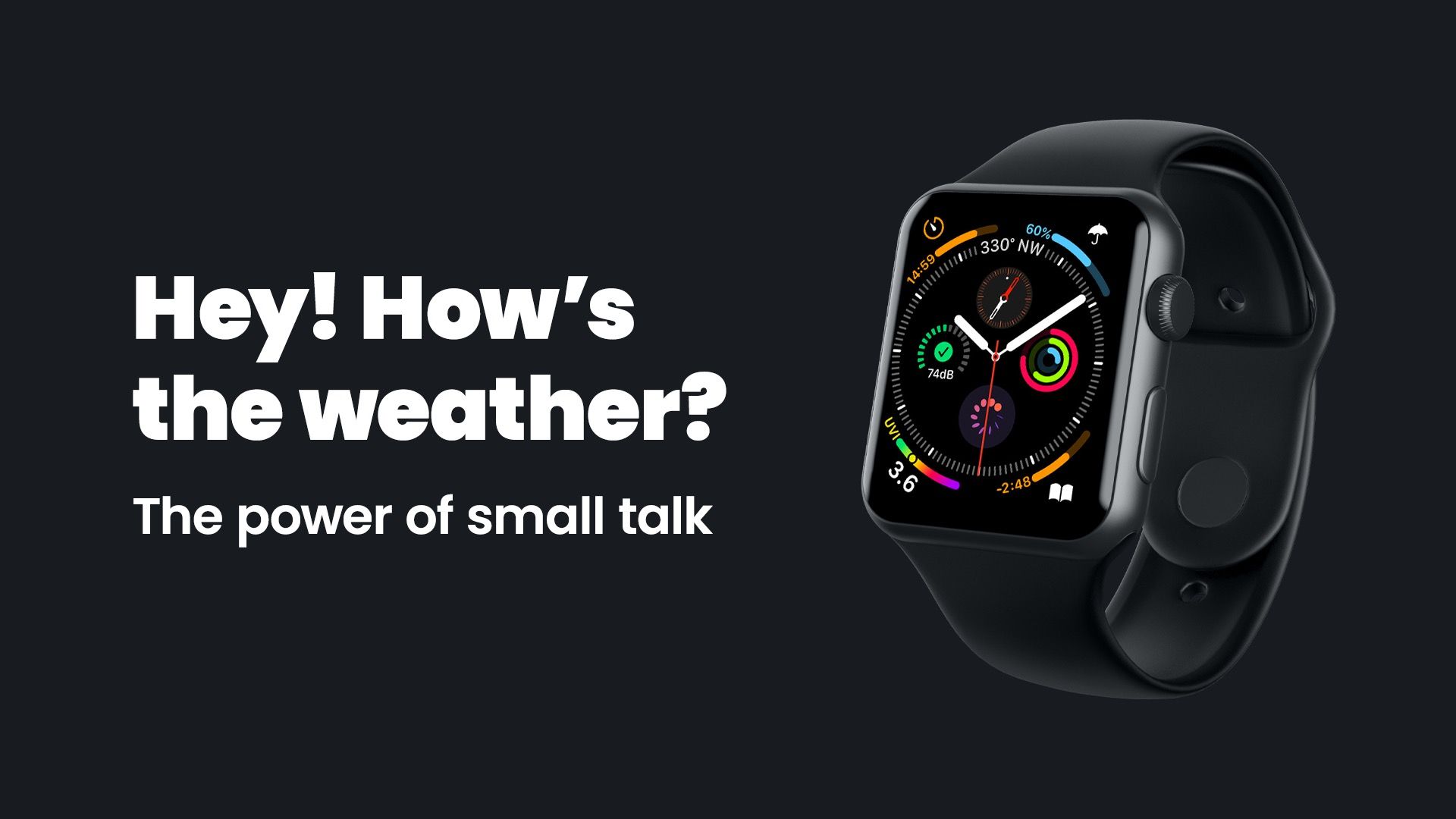Growing Virtual Relationships
Jun 26, 2023
MEET RAMBO
One of the so-called complications on my Apple Watch shows me the current temperature outside, and it comes in handy when I’m in a Zoom room and someone else in the meeting asks me about the weather where I live.
My typical workday routine has me in my near-windowless basement office before ever stepping outside the house. To quote Jim Gaffigan, I’m “indoorsy.” So when the hackneyed but inexorable, “How’s the weather where you are?” small talk begins, a quick glance at my watch gives me a healthy jumping off point.
Oh? It’s gonna be small talk, huh? Well, you’re not going to catch me off guard.
Have you ever met someone who admits to enjoying small talk? Me neither. But like me, I bet you can name a lot of people who engage in it like they love it. I have friends who somehow know the expected weather in every geographic region of the U.S., the current batting averages of each team’s star players, and the winner of last night’s Jeopardy. They come armed with banal facts and observations like some sort of small-talk Rambo.
And you know what? When developing a community online, those friends armed with banal information are, like Rambo, heroes of sorts.
When we engage in relationships, and especially when those relationships are predicated on an expectation of idea exchange, distance matters. Yes, physical distance matters (read how that plays out online in my last article), but so does perceived distance. When establishing an online community, you’re going to have to deal with both.
We can learn a lot from educators when exploring the development of online communities. Unless you just woke up from a three-and-a-half-year coma, you know the pandemic caused rapid innovation in virtual interaction. But educators, particularly at the collegiate and post- baccalaureate level, have been exploring the possibilities of online communities for a long time. I finished my master’s degree almost entirely online over a decade ago, and the tools I was using weren’t new at that time.
Early in the use of technology in education, a professor at Penn State named Dr. Michael G. Moore developed the transactional distance theory, which combines three variables (structure, dialog, and individuals’ idiosyncrasies) to identify potential transactional distance between learners and teachers, learners and content, and learners and other learners. Greater transactional distances lead to less engagement and worse learning outcomes.
With nearly nine years of virtual work under my belt, I can assure you that transactional distance also leads to less engagement and worse outcomes in the workplace. As it turns out, the effectiveness of and engagement levels in a virtual community need the same things that an in-person community needs: relationship building. It is difficult to build relationships at a distance. This is probably why the relationship between Rohan and Gondor in the Lord of the Rings wasn’t as good as it could have been. They were physically distant, and their communication came by giant bonfires on the top of mountains. That’s a tough method of relationship building.
RELATIONSHIP BUILDING TIPS
Okay, nerd sidebar over. How do we build better relationships in our online communities? It’s simple; we reduce the distance. Leaning on transactional distance theory, here are four recommendations for building a better online community.
1) Reduce the physical distance. I’m not advocating for more in-person meetings. Have you seen rental car prices these days? Sheesh! You can reduce physical distance by utilizing videoconferencing technology effectively. One week before I wrote this, I had a meeting with a church planting leader in Australia while sitting in my basement office two dozen miles east of Washington, D.C. Every Monday afternoon, I meet with my team from that same office, while they are in Chicago, Kansas City, Harrisburg, Annapolis, and Orlando. We can’t actually shrink distances, but virtually, we can. Get online. Get a big monitor so you can see everyone, and turn your bleeping camera on so they can see you.
2) Structure an absence of structure. If you come into a meeting with a wall-to-wall agenda, you will exchange a lot of information, but you will fail to develop any relationship. Failure to develop relationship will hurt post-meeting collaboration and often lead to suboptimal results. When you play The Legend of Zelda: Breath of the Wild, you can pretty much go straight to the big final boss. You may even defeat him, but that battle will be way harder than if you’d taken the time to do the many side quests that provide you a supportive community and hours of skill development. Your online gatherings need to allow for side quests.
I’m not suggesting you chase rabbit trails the whole gathering. Have an agenda, but allow for unstructured time. If Dorothy had been laser-focused on staying on the yellow brick road, she never would have met the Tin Man. Your agenda should be your yellow brick road, the path leading you where you want to go, but straying a little left or a little right will foster new conversations, build trust, affirm participants’ agency, generate new and potentially novel ideas, and maybe even lead you to discover a new, essential member of your community.
3) Increase dialog. I was on Zoom recently with three other people and one of them forgot that the “dia” prefix in dialog is derived from ancient Greek and is suggestive of “in different directions” or “between.” In other words, he talked the whole time. This is where it would have been helpful to have my small-talk Rambo friend. Effective community happens when the members of the community feel a social connection and participate by sharing knowledge, asking questions, and supporting one another. Social connection is developed through dialog.
Small-talk Rambo blasts through barriers to dialog by modeling dialog while lowering the bar for sharing knowledge, asking questions, and supporting one another.
Small-talk Rambo: “It’s a hot one here in San Diego! How’s the weather where you are?”
Buffalo Barbara: “We just got four feet of snow overnight.”
Maryland Matt: “Is that normal for this time of year?”
Buffalo Barbara: “I wouldn't say it’s normal, but it’s not unheard of.”
Small-talk Rambo: “Well, as tough as dealing with that is, I bet that will give the Bills a nice advantage over the Dolphins tomorrow!”
That five-line conversation had information sharing, questions, and support, setting the tone for whatever conversations follow. Identify your small-talk Rambo, encourage them to use their special skills, and allow time for it by structuring an absence of structure.
4) Manage your idiosyncrasies. Your ability to control others’ idiosyncrasies is limited at best, but if you cultivate appropriate self-awareness, you can manage your own. Jason recently wrote this great article about self-awareness and breaking your communication bad habits.
Specific to the online space, I’d suggest being aware of what gets your attention. As someone with ADHD and three screens in front of them while on most Zoom calls, I suggest seriously (and admittedly somewhat hypocritically) that you minimize your distractions. If you want the most from participating in an online community, ignore the red dots telling you how many emails and texts you have. Close your Internet browser. Get some fidgets. I have two fidget cubes, an old valve system I took out of my motorcycle, various candles, and at least a dozen unfolded and misshapen paper clips to keep my hands occupied and the distractible parts of my brain engaged while working on building an online community.
WE’RE ALL HUMAN
“But Matt, I do all of these things and Buffalo Barbara and I still can’t seem to click.” I get it. Even when I’m on my best behavior and focused on my Zoom calls, pushing dialog, and leaving space in the conversation, relationships don’t always gel the way I want them to. People have different perspectives, and you know what sucks?
You can’t change what they brought into the meeting.
We deal with others’ baggage in every relationship we have. Some people are weirdly positive and bubbly all the time and you’re wondering how they even swallowed the rainbow they’re spewing. Some people are overly negative and you wonder if maybe they listened to R.E.M.’s “Everybody Hurts” one or seventy too many times.
Some people we interact with remember when they got their first color TV while others were born with an iPhone in their hand. Sometimes someone is just having a bad day. And worst of all, sometimes their plan, that is different from yours, is just as good as yours and you have to argue about a right-right decision (the second hardest of all decisions after wrong-wrong decisions).
We project these differences on others all the time and they project them on us. It’s inevitable. So, when you’re on Zoom and the person you’re talking to is treating you like you’re an idiot because you weren’t alive when Nixon was president, start with grace and then go back through the steps of creating community.
Tie on your red bandana and become small talk Rambo for a bit until you find some common ground and reassure the other person that you’re both human and you both actually want to be in community for a reason. Maybe you need to leave some space for them to go off on a side quest, so they can feel heard. If that doesn’t work, then just ask them a question about why they think there is tension and actually listen to their answer without preparing a retort.
Online community is important. We can have deep and meaningful relationships with people all over the planet if we combine technology with appropriate practice. Geography need not dictate the depth of community we experience because we can reduce the perception of physical and transactional distance.
By Matt Murphy - VP of Mission Support, Stadia
Matt works for Stadia, a fully virtual organization, and also works remotely as the Pastor of Operations at True North Community Church in Long Island, NY. He lives in North Beach, MD with his wife, 2 kids, and a chihuahua.

